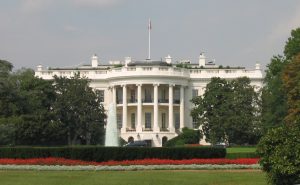 Since the Trump Administration announced an end to Deferred Action for Childhood Arrivals (“DACA”) on September 5, 2017, members of Congress have been negotiating a path forward to keep Dreamers from being deported. In recent weeks, as March 5 has gotten closer (the day that “DACA” is slated to end), members of both parties of Congress, have floated various plans to address the end of DACA. While many plans have been discussed, the White House has been silent on what needed to be in any DACA related legislation for President Trump to sign a bill into law. On January 25, 2018, the White House finally laid out what President Trump wants in any immigration bill addressing the end of DACA, in a one page policy memo. In return for protecting Dreamers, the Trump Administration wants widespread changes to U.S. immigration law, which would lead to a dramatic decrease in legal immigration.
Since the Trump Administration announced an end to Deferred Action for Childhood Arrivals (“DACA”) on September 5, 2017, members of Congress have been negotiating a path forward to keep Dreamers from being deported. In recent weeks, as March 5 has gotten closer (the day that “DACA” is slated to end), members of both parties of Congress, have floated various plans to address the end of DACA. While many plans have been discussed, the White House has been silent on what needed to be in any DACA related legislation for President Trump to sign a bill into law. On January 25, 2018, the White House finally laid out what President Trump wants in any immigration bill addressing the end of DACA, in a one page policy memo. In return for protecting Dreamers, the Trump Administration wants widespread changes to U.S. immigration law, which would lead to a dramatic decrease in legal immigration.
A Path to Citizenship for Dreamers
The White House has stated that it is open to providing legal status to 1.8 million foreign nationals in the United States without legal status. This figure would include Dreamers as well as close to a million other individuals (though the White House has not indicated who these individuals would be). The Trump Administration not only is willing to provide these individuals with legal status, but is also willing to provide them with a potential path to citizenship. Under the White House’ plan, these individuals would be able to become citizens after a period of 10 to 12 years, if certain eligibility requirements are met (which the administration has not yet laid out).
An Elimination of the Diversity Visa Lottery
In return for a path to citizenship for the Dreamers (and others), the Trump Administration wants to dramatically decrease legal immigration. The first part of this plan, is an end to the Diversity Visa Lottery. The Diversity Visa Lottery is a program, under which 50,000 visas a year, are set aside for individuals to become lawful permanent residents from countries with historically low rates of immigration to the U.S. The White House plan would eliminate this program completely, and allocate the 50,000 visas issued yearly under the program to other green card categories.
Increased Border Security
The White House wants an increase in border security in any DACA deal. In particular, the White House wants Congress to allocate $25 billion for: the creation of a border wall across the entire southern border with Mexico; and hiring more Department of Homeland Security employees, immigration judges, and ICE attorneys. The White House also seeks an increase the use of expedited removals for individuals who overstay their visas, and wants to make it harder for individuals to claim asylum upon entry into the United States.
An End to Most Family-Based Immigration
Finally, the Trump Administration wants to significantly curtail family-based immigration. Under the current immigration system, U.S. citizens and lawful permanent residents, can petition for children, parents, spouses, and siblings (U.S. citizens only), to become green card holders. The White House wants to make it so that U.S. citizens and lawful permanent residents can only petition to obtain green cards for spouses and children under 21 years of age.
What Does This Mean?
At this point, it is highly unlikely that the Trump Administration will be able to get all of their proposed policies through Congress. Conservatives in the House of Representatives have already voiced their strong displeasure at the idea of granting a path to citizenship to Dreamers. Because a bill will not be able to pass the House without Conservative votes, it is highly unlikely that a bill which includes a path to citizenship will make its way through the House. In the Senate, Republicans need nine Democrats (if all Republicans vote in favor) to pass any legislation. Democrats have stated that they will not vote for a bill which includes the Administration’s plan to cute family-based immigration. Democrats however have stated that they would be open to some cuts to family-based immigration (just not as large as what the President wants). Therefore, any final bill is likely to see some decrease in family-based immigration.
Because of the uncertainty surrounding cuts to family-based immigration, individuals seeking to sponsor a relative for a green card, should start the process ASAP. The White House has indicated, that its proposed cuts to family-based immigration would only apply moving forward. Individuals who already have a Form I-130, Petition for Alien Relative filed on their behalf, will still be able to obtain a green card. Therefore, it is imperative that anyone thinking of sponsoring a relative for a green card File Form I-130 ASAP before any changes go into effect.
 Immigration Lawyer Blog
Immigration Lawyer Blog

